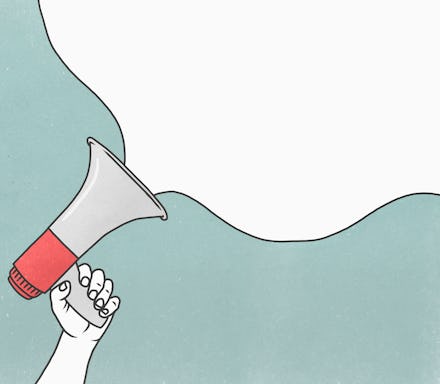How to explain protesting and rioting to someone who doesn't get it

We’re all having a lot of hard conversations these days. I am finding myself frequently frustrated as I patiently explain why people are more important than property and why rioting is a form of civil disobedience that has been effectively employed as a means of creating change since the founding of these United States. When my rhetorical skills falter, it feels like I’ve failed to convey the urgency of this moment in history as a possible turning point for social justice. As a result, I have found myself wondering: How do you explain protesting and rioting to people with a certain type of privilege who just don’t get it?
To be clear, I am a white person having conversations about race and protest with other white people — this is crucial, fellow white people, because repeatedly explaining racism and oppression is a burden that should not fall solely upon Black Americans and people of color. Eradicating racism is good for everyone. The good news about these conversations is, there is a formula that works as a starting point on almost everyone. Keep in mind though, that these conversations often take a lot of energy — energy you might want to spend on people you actually want to invest in. Some of us will have the bandwidth to educate strangers and jerks, and some of us will not.
“Presenting your perspective from the ‘I,’ explaining the impact this movement is having on you, and clearly stating what you need and how they can help meet that need is a great beginning,” says Stefani Goerlich, a Detroit-based psychotherapist. Using this conversational equation is an effective way to keep difficult conversations organized and defused.
If, for example, you are trying to tell a clueless person why police brutality during protests against police brutality is problematic, Goerlich suggests saying something like, “‘When I see protestors being attacked — either physically by police or verbally by folks I’m talking to, it makes me feel sad and honestly a bit angry too. I need to feel like we can discuss hard topics without insulting the people involved. Could we start again, and focus on our own beliefs around justice and policing?’” The thought behind this approach is that it can be harder to disagree or be combative with someone who’s willing to be vulnerable and obviously trying to get along.
When you enter into this kind of conversation, though, you are issuing an invitation to a dialogue, so you have to be prepared to hold space for the other person’s feelings even when you are disagreeing. “Try to identify what their own needs might be and the impact these events are having on them,” she says. Even if you think they are being irrational, listen to what they say for an ear for what the underlying feelings are beneath the senselessness. Are they scared? Angry? While our perspectives on issues may differ, most of us can relate to these fundamental human feeling states, so understanding the feelings someone is having around an issue can help you connect.
As tempting as it is, taking a self-righteous stance often alienates people. You can disarm them by acknowledging your own biases.
Once you have identified and acknowledged how they feel or what’s important for them, then you can streamline an argument that will make sense to that person. “Tailor your statements to respond to the impact they are experiencing and tell them how the protests can help them meet their needs,” Goerlich suggests. So if, for example, someone tells you that freedom is really important to them, you can explain how protesting against oppression created the foundation of the notion of freedom in this country. You can also direct them towards resources about the continuing struggle that Black Americans have had accessing the freedom this country awards white people.
As tempting as it is, taking a self-righteous stance often alienates people. You can disarm them by acknowledging your own biases. “It shows that you are self-aware, which prevents your conversation partner from weaponizing your point of view against you,” Goerlich says. So, in a way, owning your own bias or privilege can help bolster your argument –or at least keep people from using it against you. Goerlish also points out that this is a way of creating an atmosphere of collaboration, rather than conflict. “Owning your biases creates opportunities for dialogue because it allows you to acknowledge your own knowledge gaps and begin to see the other person not as an adversary but as a resource.”
It is really tempting to call people out right now. Being aggressive about it can also put a quick end to a potentially fruitful conversation. “Calling out can quickly turn into name-calling, which just makes the other person feel defensive and shuts down the dialogue,” Goerlich says. “Try not to say, ‘that’s racist!’” she says. It might be true as hell but it’ll shut a really important conversation down quick. “Instead, try, ‘when you say that the protesters are all ‘ignorant thugs,’ it hurts — because I think of my coworkers/kids/friends who have been called thugs just because of what they look like and I know how unfair that is.’” This is a gentle call out that keeps you from repeating the behavior — name calling — that you are trying to bring attention to.
Everyone has a hot head right now, and you are probably not going to stay cool in every moment. But taking the time to be sometimes irrationally calm in your conversations is more likely to convince others to become allies, and it also shows your own unwillingness to behave callously in the face of conflict, which is kind of the point of everything right now. “Does this take more words? More effort? More time? Sure,” Goerlich says. “But it’s also more likely to have an impact.”